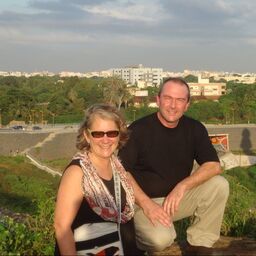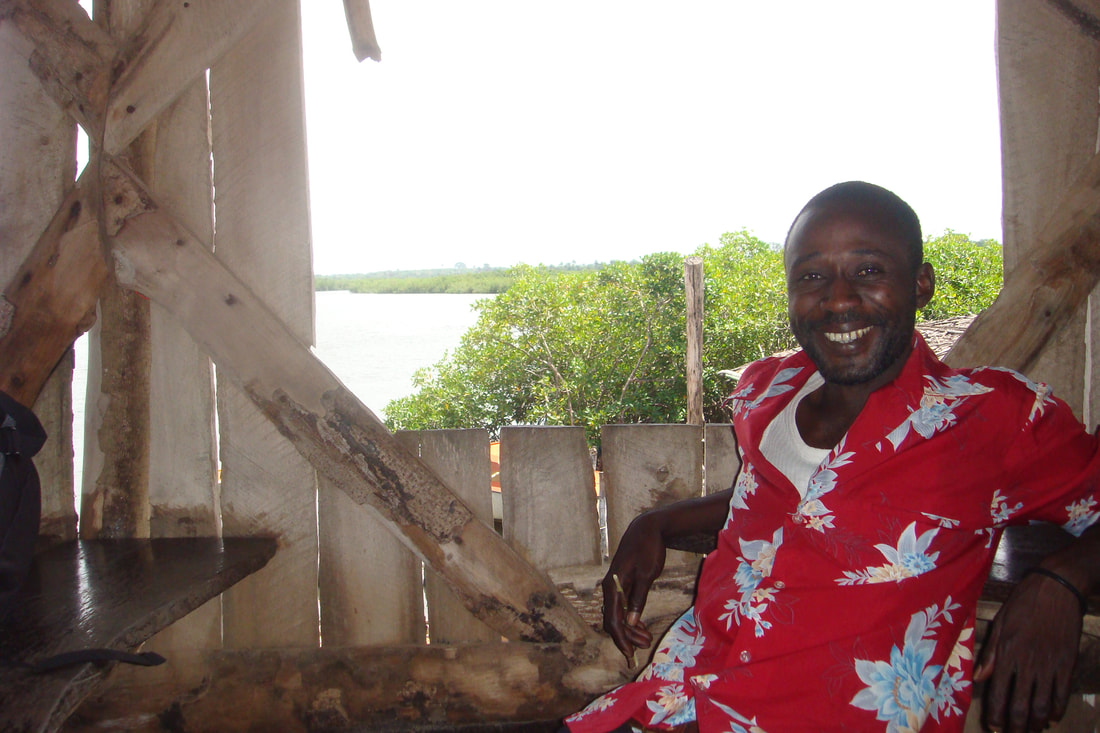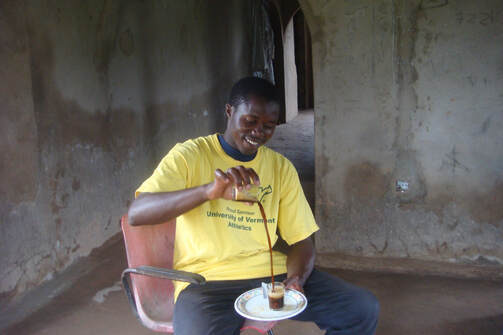Love & Water: A True Story by Sue Dixon
 Sue Dixon and Dave Jonah on their 25th anniversary trip to the Gambia
Sue Dixon and Dave Jonah on their 25th anniversary trip to the Gambia
Part 1. Ten Years Ago...
Happy (belated) Valentines Day 2020 – We hope you enjoy this story of hope and friendship across miles of time and difference, offered in celebration of our common humanity and ability to make a difference in the world.
Rain pelts the Airbus 320 landing in Senegal for refueling midway between Washington DC and Johannesburg. Dave and I are among the handful of passengers deplaning. I overhear a flight attendant telling a couple nearby, "there is nothing to see in Dakar."
Nine months earlier we had read "The Songs of Senegal" in the Sunday New York Times and now we"re 4,000 miles from home with a protective soup of inoculations surging through our veins to celebrate our 25th wedding anniversary."And the adventure begins," Dave whispers exciting the airpots, men swarming to offer taxi, currency exchange and tours.
Dakar is a sprawling city of 6 million with a chaotic order difficult to decode. Its humanity fills an entire peninsula jetting into the Atlantic at the eastern most point on the African continent. Here, centuries ago, millions of people were chained onto slave ships bound for the Americas and other distant points.
From Senegal, we travel to The Gambia, an English-speaking country hugging the two-mile wide tidal river that bears its name. Swept into the flow of humanity, we make out way to the Safari Gardens hotel in the costal town of Fajara. We are the only guests. Our anniversary it so happens during which is when malaria is at its peak.
We hired a soft-spoken Mandinka man as our guide. Traveling with Sainey is a gift. We follow as he points out red colobus monkeys, a forest cobra and lots of birds – the fire finch, hamerkob, sunbird and weaver. We ask questions and observe without worry of getting lost, hassled or ripped off. Relaxing in a river-side Lodge resembling a collection of treehouses, we learn bits of Sainey’s story. His father was a fisherman, who died in an accident when Sainey was five. After his mother remarried, Sainey was raised his grandfather. He has a wife and four-week-old daughter in his village 150 miles up river. Conversation stops when I scream, a monkey poked my neck. The waitress quickly tosses Sainey a stick to fend off the primates. “Hold onto your camera,” he warns, these mischievous creatures are renowned for snatching and bolting into the mangroves never to be seen again.
The only definite plan we had before leaving the United States was to spend our actual anniversary at the Sandele eco-resort on the southern coast near the fishing village of Kartong. We arrive to be greeted by Lamin Drummeh. He ushers us to a beautiful circular room, and delivers two glasses of wonjo, a sweet red “welcoming” drink. Again, we are the only guests. The pulsing rhythm of waves calls from the distance, mixing with birdsong and the occasional screech of a monkey. It is easy to be comfortable at Sandele, despite intense heat and humidity.
By day we explore the village, delivering notepads, pencils and sharpeners to the school. Bicycling to the river where women harvest and cook oysters, and men smoke fish. Elderly women chant prayers upon us in a ritual blessing at an ancient crocodile pool. We are welcomed into a family compound to share a meal of fish and rice from a common bowl.
Evenings we sip Julbrews and encourage the staff – Lamin and Sarju, our waiter; Mbassey, housekeeping; Omar, security and Muhammad, the fabulous cook – to sit with us and discuss family, work and home. “Poverty is our only problem,” Lamin admits, sharing his dream to someday go back to his village to farm and raise a family.
At the end of our stay the resort is shuttered and we share a bush taxi with staff to Serrakunda. Lamin invites us home for a meal. He brews green tea on a small charcoal stove by his feet, while his wife Awa cooks domodah, beef and vegetables in tasty peanut sauce. Carefully pouring two small glasses, Lamin hands a cup of sweet brew to Dave and another to me. The custom is to sip three cups of tea while enjoying hospitality and conversation.
Happy (belated) Valentines Day 2020 – We hope you enjoy this story of hope and friendship across miles of time and difference, offered in celebration of our common humanity and ability to make a difference in the world.
Rain pelts the Airbus 320 landing in Senegal for refueling midway between Washington DC and Johannesburg. Dave and I are among the handful of passengers deplaning. I overhear a flight attendant telling a couple nearby, "there is nothing to see in Dakar."
Nine months earlier we had read "The Songs of Senegal" in the Sunday New York Times and now we"re 4,000 miles from home with a protective soup of inoculations surging through our veins to celebrate our 25th wedding anniversary."And the adventure begins," Dave whispers exciting the airpots, men swarming to offer taxi, currency exchange and tours.
Dakar is a sprawling city of 6 million with a chaotic order difficult to decode. Its humanity fills an entire peninsula jetting into the Atlantic at the eastern most point on the African continent. Here, centuries ago, millions of people were chained onto slave ships bound for the Americas and other distant points.
From Senegal, we travel to The Gambia, an English-speaking country hugging the two-mile wide tidal river that bears its name. Swept into the flow of humanity, we make out way to the Safari Gardens hotel in the costal town of Fajara. We are the only guests. Our anniversary it so happens during which is when malaria is at its peak.
We hired a soft-spoken Mandinka man as our guide. Traveling with Sainey is a gift. We follow as he points out red colobus monkeys, a forest cobra and lots of birds – the fire finch, hamerkob, sunbird and weaver. We ask questions and observe without worry of getting lost, hassled or ripped off. Relaxing in a river-side Lodge resembling a collection of treehouses, we learn bits of Sainey’s story. His father was a fisherman, who died in an accident when Sainey was five. After his mother remarried, Sainey was raised his grandfather. He has a wife and four-week-old daughter in his village 150 miles up river. Conversation stops when I scream, a monkey poked my neck. The waitress quickly tosses Sainey a stick to fend off the primates. “Hold onto your camera,” he warns, these mischievous creatures are renowned for snatching and bolting into the mangroves never to be seen again.
The only definite plan we had before leaving the United States was to spend our actual anniversary at the Sandele eco-resort on the southern coast near the fishing village of Kartong. We arrive to be greeted by Lamin Drummeh. He ushers us to a beautiful circular room, and delivers two glasses of wonjo, a sweet red “welcoming” drink. Again, we are the only guests. The pulsing rhythm of waves calls from the distance, mixing with birdsong and the occasional screech of a monkey. It is easy to be comfortable at Sandele, despite intense heat and humidity.
By day we explore the village, delivering notepads, pencils and sharpeners to the school. Bicycling to the river where women harvest and cook oysters, and men smoke fish. Elderly women chant prayers upon us in a ritual blessing at an ancient crocodile pool. We are welcomed into a family compound to share a meal of fish and rice from a common bowl.
Evenings we sip Julbrews and encourage the staff – Lamin and Sarju, our waiter; Mbassey, housekeeping; Omar, security and Muhammad, the fabulous cook – to sit with us and discuss family, work and home. “Poverty is our only problem,” Lamin admits, sharing his dream to someday go back to his village to farm and raise a family.
At the end of our stay the resort is shuttered and we share a bush taxi with staff to Serrakunda. Lamin invites us home for a meal. He brews green tea on a small charcoal stove by his feet, while his wife Awa cooks domodah, beef and vegetables in tasty peanut sauce. Carefully pouring two small glasses, Lamin hands a cup of sweet brew to Dave and another to me. The custom is to sip three cups of tea while enjoying hospitality and conversation.



